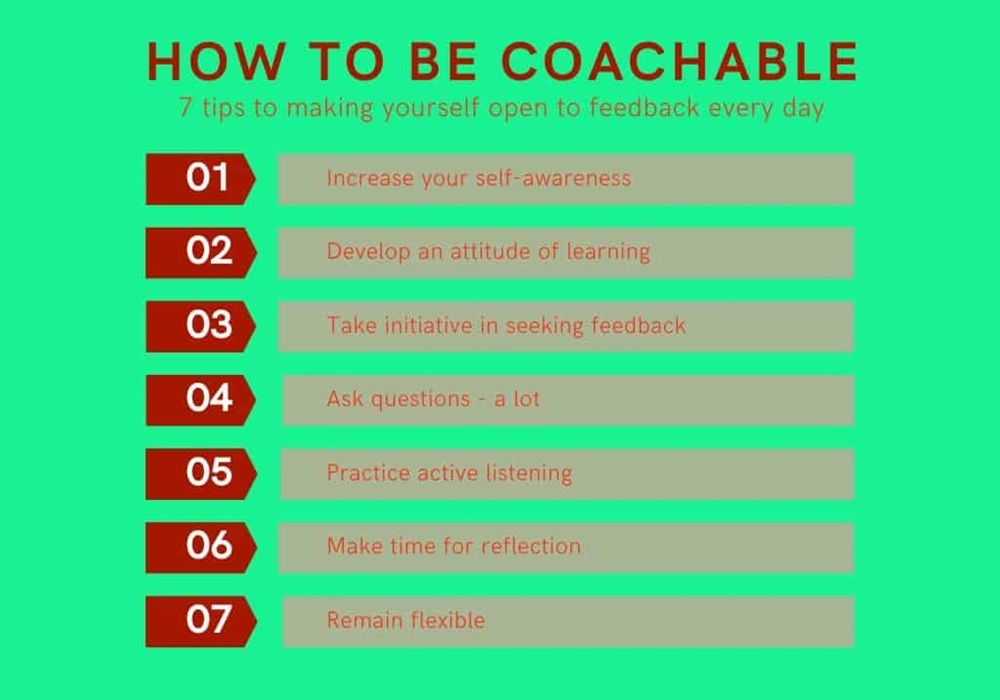Is your ego holding you back? Discover the importance of coachability, how it helps unlock one’s potential and paves the way for long-term success.
Coaching has been proven to be an extremely amazing resource in boosting one’s chances of success at work and in life. That said, it does no good if one is not willing to learn and adjust their behaviors. This is where the trait of coachability comes into play.
Highlights
- Coachability is the willingness to accept feedback and apply it to improve and grow. Such a trait fosters growth, collaboration, and success by enabling individuals to learn, adapt, and improve.
- Embracing coachability is challenging, as it requires overcoming natural defensiveness and fear of change, even though it ultimately leads to self-improvement.
- Tips for becoming more coachable include cultivating self-awareness, adopting a growth mindset, actively seeking feedback, asking questions, listening actively, reflecting, and embracing flexibility.
What is Coachability?
Coachability is the willingness to be open to feedback and act upon it. It is the ability to take in, understand, and apply new ideas and methods presented by another person – be it a coach, mentor, or anyone else. Such a mindset lays the critical foundation for rapid growth – both professionally and personally.
A coachable person is one who is eager to listen, take feedback in stride, and make positive changes based on people’ input. They are aware of their own limitations – as well as the value of learning from others. No matter how difficult it is, they stay receptive to new perspectives, and are pleased to adjust their behavior to make the most of any situation.

Why is Coachability Important?
Coachability is an incredibly desirable trait to have on one’s journey to success. It allows one to be better exposed to new ideas, which in turn helps them grow and acquire the skills necessary to move forward. Aside from that, it also encourages collaboration – as people are more likely to work with those who are humble and willing to learn.
Benefits of coachability:
- Boosted productivity: Being coachable makes it easier for one to learn and experiment with new approaches, resulting in greater efficiency.
- Developed problem-solving skills: Openness to feedback enables one to identify and tackle issues more effectively, thus improving their problem-solving skills.
- Enhanced team dynamics: Coachability encourages collaboration and strengthens the bond between team members.
- Improved career opportunities: Being coachable makes one a desirable candidate for any job or promotion.
- Increased mental and emotional well-being: An open-minded attitude translates to greater self-awareness, confidence, and emotional stability. When one is capable of adjusting swiftly to changes, they become more potent in combating stress and anxiety.
Coachability Examples
- Admitting when you are wrong: Instead of arguing or defending their own point, a coachable person is likely to admit their mistake and focus on coming up with an effective solution.
- Listening carefully: Coachable people pay attention to the advice offered by others and consider all perspectives before making decisions.
- Taking initiative: They take the first step towards learning something new and actively seek out opportunities for growth.
- Asking questions: They ask meaningful questions that help them understand the material better or refine their skills.
- Giving feedback: They provide constructive suggestions to their colleagues, peers, or mentors – and reflect on any advice given in return.

Why is It So Hard to Embrace Coachability?
It is natural to feel intimidated when faced with something new, especially if it means having to change one’s behavior. At the end of the day, people’s intrinsic tendency is to become defensive and reject feedback, no matter how well-intent it is.
However, embracing coachability doesn’t mean giving up your own opinions and values. It simply means being receptive to other perspectives and accepting feedback – in order to reap the many benefits that come with it.
Coachability is not about being perfect; it’s about continuous self-improvement. The key to embracing this trait is putting yourself out there and facing criticism without letting ego or fear get in the way. While the process can be challenging at times, the results are well worth it!
Read more: 20 Bad Habits in Life That Impacts Relationships & Success
7 Tips on How to Improve Your Coachability
Coachability isn’t an innate talent; it’s a skill to be cultivated and strengthened over time. It hinges on two core elements: self-awareness and a genuine desire to evolve for the better.
Becoming more coachable requires a deep understanding of yourself – including your motivations, how your emotions influence your decisions, personal strengths/ weaknesses – coupled with a commitment to making the necessary changes to realize your vision.
Sharpen self-awareness
Self-reflection is crucial. Take a few minutes each day to analyze your accomplishments and areas for improvement. Observe how your behavior impacts others, and identify patterns or habits that hinder your progress.
For example, do you become defensive when receiving feedback? Do you hesitate to ask for help, even when struggling?
Recognizing these tendencies is the first step toward addressing them. You may consider techniques such as journaling or using self-assessment tools to gain deeper insights.
Cultivate a growth mindset
It is about shifting your perspective to actively seek opportunities for growth and development in all aspects of life. A mindset that embraces challenges as learning experiences rather than threats fosters openness to new ideas – a hallmark of coachability.
Instead of viewing a project setback as a failure, ask yourself, “What can I learn from this experience? How can I approach this differently next time?”
Read more: 200 Self-reflection Questions – Toolkit for Life Pilgrims
Proactively solicit feedback
Don’t wait for feedback to come to you. Rather, you should actively seek it out from mentors, colleagues, friends, and even family members – and should not take any negative advice as a personal attack.
When asking for others’ input, try to be as specific as possible. Instead of “How am I doing?”, a better way to initiate the conversation might be “How could I have handled that presentation more effectively?” or “What specific skills could I develop to improve my performance in this area?”
Ask insightful questions
Curiosity is your ally. The more you understand, the better you can apply new knowledge.
For example, instead of simply asking “How do I use this software?” ask “What are the underlying principles behind this function, and how does it connect to the overall workflow?”
Crucially, it is advisable that you clarify anything you don’t understand or agree with. This ensures you’re grasping concepts correctly and applying them effectively.
Practice active listening
Truly listening goes beyond simply hearing words. When receiving someone else’s feedback, focus intently on what the speaker is saying, rather than formulating your response. Pay attention to their body language and tone, and respond with clarifying questions – so that you may have a better understanding of their perspective.
For example, you could say, “So, if I understand correctly, you’re suggesting that I…” This demonstrates that you value their input and are genuinely trying to embrace their point of view.
Read more: Not Listening – The Silent Killer of Relationships and Success
Dedicate time for reflection
Reflection is essential for maximizing the impact of feedback and learning. Schedule regular time, either alone or with a mentor, to review your progress and reflect on what you’ve learned. Identify areas where you’ve improved and areas where you still need to grow.
Consistent reflection reinforces a growth mindset and keeps you motivated and focused on your goals.
Read more: 110 Self Discovery Journal Prompts by Topic
Embrace flexibility
Rigidity is what stifles growth. Embracing coachability means being receptive to new ideas and approaches, even if they challenge your established routines or beliefs – so as to adapt to changing circumstances.
For example, if your manager suggests a new workflow process, be willing to try it, even if you’re comfortable with the old way.
Read more: Self-coaching – The Art of Being Your Own Coach

Coachability Quotes
Without challenge, there is no progress.
Unknown
The only true wisdom is in knowing you know nothing.
Socrates
It’s not what happens to you, but how you respond that matters.
Epictetus
It doesn’t matter where you are coming from, all that matters is where you are going.
Brian Tracy
Having the courage to change your mind takes tremendous strength and faith in yourself.
Unknown
Successful people do what unsuccessful people don’t want to do. Don’t wish it were easier; wish you were better.
Jim Rohn
Life is a journey, not a destination.
Ralph Waldo Emerson

Read more: 85 Embracing Change Quotes – Thriving in Transformation
Other resources you may be interested in:
- Life Coaching: Key to Attaining Holistic Happiness & Self-understanding
- 7 Key Coaching Principles for Long Lasting Results
- Feedforward: 10 Reasons to Try It Over Feedback
- Shooting the Messenger: Why Do We Blame Others for Bad News?
Let’s Tread the Path Together, Shall We?


